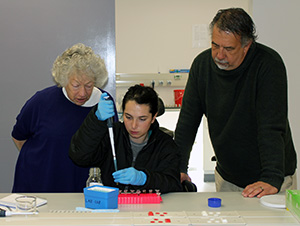Latest News Archive
Please select Category, Year, and then Month to display items
10 July 2018
Photo Supplied
 Shindré-Lee Simmons, one of the veterans in the Kovsie women’s hockey team for this year’s national student championship.
Shindré-Lee Simmons, one of the veterans in the Kovsie women’s hockey team for this year’s national student championship.
The Kovsie men’s and women’s hockey teams have positive expectations for the University Sport South Africa (USSA) national student tournament.
The USSA championships were hosted by the University of the Free State (UFS) from 2 to 6 July 2018. This year’s championships will have 45 competing teams and will thus be the biggest ever USSA hockey tournament.
For the female squad to qualify for the 2019 Varsity Sports tournament, they have to secure a spot among the top-seven teams. In order to get back into the A section, the Kovsie men’s team must win their tournament.
The matches are scheduled to take place on the UFS Bloemfontein Campus astro fields.
The UFS women’s team, captained by Antonet Louw, is set to play on Monday at 15:35 against Nelson Mandela University (NMU); on Tuesday at 17:00 against the University of Johannesburg (UJ); and on Wednesday at 18:25 against North-West University (NWU). The play-off matches will take place on Wednesday, Thursday, and Friday.
The men’s team, with Cheslyn Neethling as captain, will play on Monday at 17:00 against the Central University of Technology; on Tuesday at 15:35 against the Tswane University of Technology; on Wednesday at 17:00 against the Vaal University of Technology; on Thursday at 18:25 against the University of KwaZulu-Natal; and on Friday at 15:35 against Rhodes University.
Monkey research attracts international attention
2016-07-11

Prof Trudy Turner from the University of
Wisconsin-Milwaukee and Prof Paul Grobler
from the Department of Genetics at the
University of the Free State, together with one
of the students researching monkey genes.
Photo: Siobhan Canavan
For this year’s Summer School programme, Prof Paul Grobler, from the University of the Free State Department of Genetics focuses on research about the conflict between monkeys and humans in areas where monkeys are regarded as problem animals.
Global expert part of research
This year, Prof Grobler is hosting a group of students and lecturers from the United States of America (USA). The group includes Prof Trudy Turner from the University of Wisconsin-Milwaukee (UWM), a global expert on vervet monkeys. She has been working with the Department of Genetics at the UFS for the past fifteen years, and has also been appointed as an Affiliated Professor in the department.
“The Summer School programme is an opportunity for the American Primatology students to gain practical experience in Africa,” says Prof Grobler.
International interest in Summer School
This year’s Summer School programme involves four lecturers and nine students. The lecturers are from the University of Wisconsin-Milwaukee (UWM), the University of California, Los Angeles (UCLA), Boston University, and Central Washington University.
“We use the genetic information to determine
how monkeys historically infiltrated the
different areas in South Africa.”
This year’s focus is on the genetic structure of the monkeys in South Africa, and research that is being done on the differences and similarities in monkeys from different areas. “We use the genetic information to determine how monkeys historically infiltrated the different areas in South Africa,” says Prof Grobler.
Local nature reserve acting as host
The group will perform field work, including observing monkeys in the Soetdoring Nature Reserve, as well as laboratory work in the department, where they will be assisted by two laboratory technicians.
Two years ago, Prof Grobler and his department tested this idea on a smaller scale, and now they hope to make this a regular event.